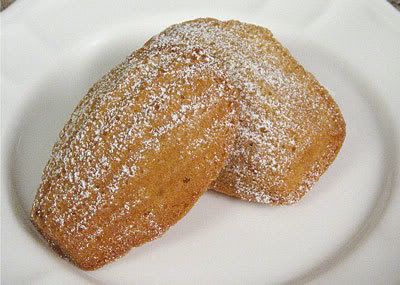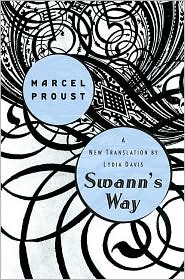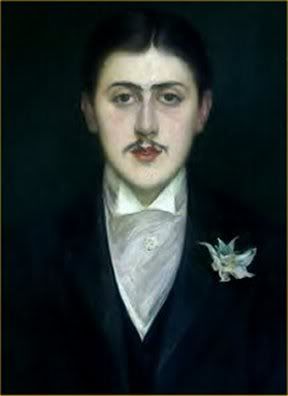"My greatest adventure was undoubtedly Proust.
What is there left to write after that?" ~ Virginia Woolf
Bonjour, Mon Amis!
Today I feel a certain je ne sais quoi.
It began right after I dipped my madeleine into a cup of linden tea.
This is dangerous, I know.
A certain Valentin Louis Georges Eugene Marcel Proust once did this, and he ended up writing 3200 pages.
That's right. A few crumbs soaked in tea provoked a flood of memories, which became seven volumes* entitled, A La Recherche du Temps Perdu (Remembrance of Things Past, or, more recently translated as, In Search of Lost Time). Published between 1913-1927, this semi-autobiographical novel is the longest ever written. Ever.
Have you read any of it?

A new translation of Volume I
Still, I like the tea and madeleine part. I also think that involuntary memory is a pretty cool thing. If you just happen to encounter the right inanimate object, it may provoke a complete memory, pure and untainted, just ripe for your creative powers to turn into art:
She sent for one of those squat, plump cakes called petites madeleines that look as though they have been molded in the grooved valve of a scallop shell . . . I carried to my lips a spoonful of the tea in which I had let soften a bit of madeleine. But at the very instant when the mouthful of tea mixed with cake crumbs touched my palate, I quivered, attentive to the extraordinary thing that was happening inside me. A delicious pleasure had invaded me, isolated me, without my having any notion as to its cause . . .
And suddenly the memory appeared. That taste was the taste of the little piece of madeleine which on Sunday mornings at Combray . . . when I went to say good morning to her in her bedroom, my aunt Leonie would give me after dipping it in her infusion of tea or lime blossom . . . as in that game in which the Japanese amuse themselves by filling a porcelain bowl with water and steeping it in little pieces of paper until then undifferentiated which, the moment they are immersed in it, stretch and bend, take color and distinctive shape, turn into flowers, houses, human figures, firm and recognizable, so now all the flowers in our garden and in M. Swann's park, and the water lilies on the Vivonne, and the good people of the village and their little dwellings and the church and all of Combray and its surroundings, all of this, acquiring form and solidity, emerged, town and gardens alike, from my cup of tea. ~ from SWANN'S WAY, by Marcel Proust, translated by Lydia Davis (Viking, 2002).
A great disparity exists between Proust's real life and his art. He was a sickly, asthmatic child with an unnatural attachment to his mother -- a spoiled sycophant, a poseur, a snob and a hypocrite who squandered his youth trying to gain favor with the idle rich. He wasted his father's money, suffered a series of unhappy affairs (he was a closet homosexual), and berated himself for not being born into the aristocracy.

His mother had a huge influence on his imagination and use of memory in writing, but he was not able to effectively bring this retrospective aspect into his work until after she died. While the presence of a person, object, or location provides sensory stimulation, it is the absence of the same that actually catalyzes the imagination -- enabling it to sift, enlarge, and shape experience into a form resembling art.
Because of his severe asthma, Proust lived in forced confinement for over a decade, sometimes never leaving his cork-lined bedroom for weeks at a time. There, he transformed a wasted life into a masterwork that explored the many dimensions, layers, and textures possible of his chosen genre. His international reputation as the most influential novelist of the 20th century remains undiminished.
With today's renewed interest in the memoir, Proust is as popular as ever. Hardcore devotees, such as the members of the Proust Society, meet regularly to discuss the novel in manageable pieces, often devoting years to reach completion. Ultimately, Proust has something for everyone. A 25-year-old reader once called his Remembrance "the ultimate blog."
MADELEINES
(12 servings)

2 eggs
3/4 tsp vanilla extract
1/8 tsp salt
1/3 cup white sugar
1/2 cup all purpose flour
1 T lemon zest
1/4 cup butter
powdered sugar for decoration
1. Preheat oven to 375 degrees. Butter and flour 12 madeleine molds; set aside.
2. Melt butter and let cool to room temperature.
3. In a small mixing bowl, beat eggs, vanilla and salt at high speed until light.
4. Beating constantly, gradually add sugar, and continue beating at high speed until mixture is thick and pale and ribbons form in bowl when beaters are lifted, 5 to 10 minutes.
5. Sift flour into egg mixture 1/3 at a time, gently folding after each addition.
6. Add lemon zest and pour melted butter around edge of batter. Quickly but gently fold butter into batter. Spoon batter into molds; it will mound slightly above tops.
7. Bake 14 to 17 minutes, or until cakes are golden and the tops spring back when gently pressed with your fingertip.
8. Use the tip of the knife to loosen madeleines from pan; invert onto rack. Immediately sprinkle warm cookies with powdered sugar. Madeleines are best eaten the day they're baked.
9. Variation: Chocolate Madeleines: Omit lemon zest. Increase sugar to 1/2 cup. Substitute 1/4 cup unsweetened cocoa powder for 2 T of the flour; sift into batter with flour.
TIPS: Lemon-butter flavor is enhanced when madeleine is dipped into lime-flower (linden) tea, aka tilleul. Savor the experience, and record your memories!

SSHHHH! Don't tell! There is evidence to suggest that Proust did not eat a madeleine, but a soggy piece of toast instead. Tant pis!
* In Search of Lost Time - Volume Titles:
Swann's Way
Within a Budding Grove
The Guermantes Way
Sodom and Gomorrah
The Captive
The Fugitive
Time Regained



Makes perfect sense. I read a novel like that a few weeks ago, or rather started to read a novel. I got so sick of the MC that I couldn't care less what happened to her, I just didn't want to listen to her anymore.
Makes sense. Would you tell the writer that you liked their writing and if they had other projects you would like to see them or would you stick with the standard rejection letter.
I think that makes perfect sense. I myself cannot tolerate Catherine or Heathcliff, and nothing Dostoyevsky ever wrote was beautifully crafted enough to make up for how much I loathed his characters.
If the writing is as you say, the book will find it's match. How nice for the writer to read that something about it stayed with you, regardless.
I think it's a wonderful compliment to an author if you like his/her writing. It is also perfectly understandable if you don't like the main character. It's been said repeatedly but bears repeating again, this is a subjective business :).
I personally would want an agent to be 110 percent with my main character to represent my book (even if the main character wants to stick a knife in me for saying this LOL). In other words, I think a main character has to come to life to the agent/editor in order for it to be the right match. I so love reading your blogs, Kristin, and thank you!
That makes sense to me. Character and writing are the make-or-break factors for me as a reader, and while bad writing (or writing that may be just fine, but happens to annoy me) will sometimes make me stop reading a story I otherwise kind of like, no amount of beautiful writing will make me want to finish a book about characters I find boring, too squicky, too passive, or totally implausible.
Mags said:
I myself cannot tolerate Catherine or Heathcliff, and nothing Dostoyevsky ever wrote was beautifully crafted enough to make up for how much I loathed his characters.
Mags, this is a knife in my heart.
Oh well, to each his own :)
Re: Cathy and Heathcliff.
I'm kinda that way about Scarlet O'Hara except I did keep reading hoping to see her get her comuppence. I guess I cared about her, but not in a good way.
This makes sense to me, but it worries me also because my protagonist in the novel I'm working on is not always likable.
I just can't write him any other way because he's human. He's not a bad guy, but he's 19 and occasionally he makes the wrong choice, thinks with the small brain, and lets his darker side overcome him on occasion. At heart, though, he's a good guy - he just hasn't get figured out how to be a good guy most or all of the time.
So....I worry when it comes time to send him out into the world whether folks will like him well enough to stick with him.
I can't write him otherwise, though, he's his own character.
I guess we'll see.
Rebecca Burgess said:
Mags, this is a knife in my heart.
Oh no, Rebecca! I am sending you a styptic pencil and an ice cream cone right away.
I've gone and drawn blood in a nice blog again. Oh damn.
I can understand Kristin's decision but I wonder what this post does to the -- perhaps a dozen writers with samples at her agency awaiting word. I imagine whoever got the pass heard via email this afternoon, but aren't all the other authors reading this, trying to decide whether their protagonists are engaging or engagingly wicked or compellingly nasty or what? I'm curious whether the agency gets a dozen frantic phone calls after a post such as this ...
I agree with your response to the work, but I hope you share your thoughts with the submitter. Too many agents just slip a form letter into the SASE, leaving the writer in the dark. You're not saying "fix X, Y and Z and resubmit" because, as you pointed out, what you disliked is intrinsic to the book and the writer's voice. But telling him/her that you really like the style would be treasured by the writer--and well need all the encouragement we can get!
I understand that perfectly too. I feel the same way about Flannery O'Connor. She's a fantastic writer, and there are a couple of her short stories I'm rather fond of. But most of them deal with characters that are so repugnant it is positively painful to spend time with them. I made the mistake of reading her collected short stories this summer. Never again.
Obviously a lot of people do not share my opinion.
Mags
Alas, you are too late. I've spent the night bleeding all over my two copies (different translations) of Crime and Punishment.
Catherine and Heathcliff and crying out for me as we speak.
Allen B. Ogey said...
"This makes sense to me, but it worries me also because my protagonist in the novel I'm working on is not always likable. I just can't write him any other way because he's human. He's not a bad guy, but he's 19 and occasionally he makes the wrong choice, thinks with the small brain, and lets his darker side overcome him on occasion. At heart, though, he's a good guy - he just hasn't get figured out how to be a good guy most or all of the time."
It's okay to have a MC with a slight darker side as long as the good side is his stronger side. We all have flaws and showing this in your MC only makes him human. The biggest thing is that he has to grow by the end of the novel. Does your MC learn from his mistakes or realize he's on the wrong path?
I understand Kristin's point. Something speaks to you or it doesn't. It just makes me wonder how ANYTHING gets published with all the knitpicking requirements (that seem to change direction like the wind) that every agent, editor, and publishing house has.
Yet James Patterson is a best seller? Good grief.
I don't know precisely why Kristin didn't want to spend time in the company of the MC but for me it had nothing to do with whether or not they were flawed or really rotten but I need to CARE. I'll tell you why I didn't care. The MC was a female detective and she overheard a couple of male detectives making a negative comment about her - say, that she's a dumb blonde. It wasn't that but for the sake of the example I'll use it. For the rest of the novel, or at least the first half I read, she was constantly, and I mean CONSTANTLY, referring to it and saying things like, "They'll be sorry when this dumb blonde solves the case" or "Bet they'll wish they didn't call me a dumb blonde". This went on ad nauseum until I finally got sick of hearing it and dropped the book.
I totally disagree that "there's no way to fix" the character.
Sounds to me like - "Oh, this might be a little work, I'd better say no."
I'm pragmatic about this. Ms. Nelson's job is to sell the MS to a publisher. It sure helps if your heart is in the process, no matter what the product. Even a manuscript. Which writers tend to infuse with almost human qualities (my darlings!) because they take so much work and love and angst and sweat and tears to create. But at the end of the day, the MS is a product for sale. Better an agent passes than takes on a book that will get pushed to the back of the "product list" by her feelings. That's my thinking. I was in sales for many years. I sold that lines I had enthusiasm for before other lines. My two cents.
Kristen,
I understand. I brought up the subject of likability on review I wrote regarding the new Beowulf movie. I did not like the main character because while he was strong, brave, and powerful, he lacked honor.
In other words, Beowulf was an ass.
I watched a movie that for two hours showcased someone I did not care for at all. I felt nothing when he died, because I did not like the character.
It could have been different with a different script, but it might also have needed a different actor. Someone who can charm the audience even if they are despicable.
It takes a brilliant actor to pull that off, but it can be done.
Michael Shurtleff was a casting director on Broadway and wrote the wonderful backlist title Audition: Everything an Actor Needs to Know to Get the Part and this was what he said about likability of performers:
You're always ahead if you cast a performer who is likable. Unlikable performers can sometimes have long, even important, careers, if they have talent, fascination, sexuality, and uniqueness, but some odd chemistry always happens in their relationship to an audience. Frequently the audience does not know they don't like a performer, but they are disturbed by him (or her), and the elements work in a strange, frequently unpredictable way. I have seen too many productions in which the actor comes off with great notices and the project fails -- because the actor is arrogant." page 170 in the trade paperback edition.
(Here is a link to my full review in case you are interested:
http://tinyurl.com/2xhqvp )
--
So when it comes to fiction, it is incumbent upon the author to make their reader want to spend time with their main character. You do not want characters to be "perfect" because those people don't exist in real life, and if there are any they are incredibly annoying. No, what you want are sympathetic characters who you recognize have faults and human frailties just like everyone else.
The reader wants to become invested and engaged in rooting for the main character to overcome whatever conflict the maniacal author throws in their path.
If the authorial intent was to create a different emotional reaction in their readers and s/he is not interested in giving their character personality face-lift, then yes it makes sense to pass on the project even if the writing was beautiful.
I did not like The Stranger by Albert Camus when I was required to read it in high school. I remember feeling an overwhelming sense of ennui when reading the story and although it made a lasting impression, I have no desire whatsoever to re-read that book regardless of how many accolades it has received.
Linda
I will read a book about a character, or characters, that I don't like, but I won't wast my time on characters the writer has not made interesting. I have to CARE what happens to the character, even if I want the character to die a painful death.
l.c.mccabe said: Beowulf was an ass.
I fervently agree.
Wiglaf, on the other hand...
But what a stupid ending. As if there was any doubt what Wiglaf the Clear-Sighted would do with that choice.